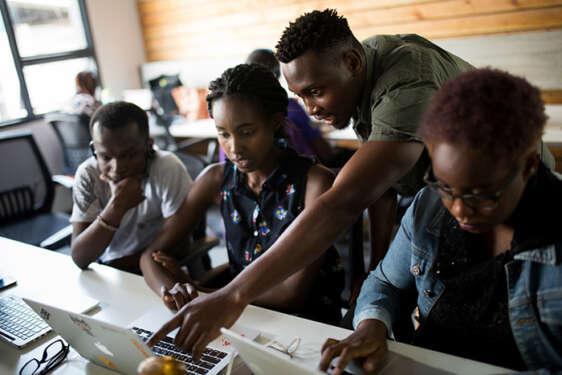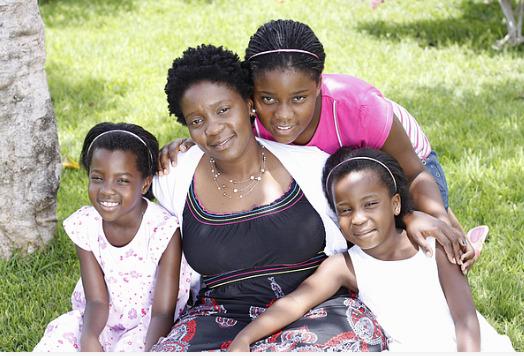- Abu Dhabi radiates optimism as over 300 startups join AIM Congress 2024
- TLcom Capital Raises $154 million in Funding to Boost Its African Growth
- Africa’s $824Bn debt, resource-backed opaque loans slowing growth — AfDB
- LB Investment brings $1.2 trillion portfolio display to AIM Congress spotlight
- AmCham Summit kicks off, setting course for robust future of US-East Africa trade ties
- Why the UN is raising the red flag on the UK-Rwanda asylum treaty
- Portugal’s Galp Energia projects 10 billion barrels in Namibia’s new oil find
- Wärtsilä Energy offers tips on how Africa can navigate energy transition and grid reliability
Author: The Exchange
- We provide economic news and analysis on the investment arena in Africa, with a particular interest in doing business. Our key areas of focus include banking, capital markets, energy, mining, manufacturing and industrial development.
Famine and drought are among the two key precursors to the devastating hunger crises that has ravaged many communities across Africa, signifying the scale and severity of food insecurity in the continent. Inarguably the Covid-19 pandemic has aggravated food security in the continent pertinently triggered by the economic fallout that has left no country unscathed. According to a recently released multi-agency report, ‘The State of Food Security and Nutrition in the World’, around a tenth of the global population an estimated 811million people were undernourished in 2020.
Also Read: FAO says Kenya requires US$87mn to ensure food security
The report, jointly published by the Food and Agriculture Organization (FAO); the International Fund for Agricultural Development (IFAD); the United Nations Children’s Fund (UNICEF); the UN World Food Programme (WFP) and the World Health Organization (WHO); revealed that the sharpest rise in hunger was in Africa, where the estimated prevalence of undernourishment …
As the 2021 International Day of Democracy draws closer it is imperative to assess and review the state of democracy in Africa; to celebrate the achievement of significant milestones hitherto whilst charting new pathways towards the attainment and realization thereof, of liberal democracies in the continent. One of the key aspirations of Africa’s Agenda 2063: The Africa We Want, the African Union’s (AU) shared 50-year development and transformation program, for realizing the full potential of the continent is an Africa of good governance, democracy, respect for human rights, justice and the rule of Law. However, on the brink of an abyss, most democracies in Africa stand, beset by a plethora of challenges which begs the question if the concept of a government of, by, and for the people is truly working for the continent? In reiteration Goal 16 of the United Nations Sustainable Development Goals (SDGs) advocates for the promotion …
One of Africa’s biggest challenges is finding employment for the youngest continental population on earth. As we all know the devil makes work for idle hands and with the unemployed and under-employed youth of Africa making up more than 25% of the population, there are many idle hands. This stresses parents, politicians, policemen and philanthropists and as birth rates grow and life expectancy lengthens we don´t seem to have very many good answers to this problem.
Also read:Burgeoning Sub-Saharan Africa Youth Population To Revolutionize its Economy Report
Yet a meaningful percentage of Africa’s young population is better educated than it has ever been and has a much better understanding of the global economy, trends, opportunities and technology than at any point in history. This small but significant percentage has been educated to degree level, is hungry for opportunity, fiercely ambitious and does not expect a handout from a Western …
The focus over this period, undoubtedly, is on a number of listed corporates reporting their earnings. Taking a step back, Centum, BAT Kenya and East African Breweries Limited (EABL) started this round of earnings’ campaign with release in July.
Centum reported financials for the year ending 31st March 2021 a drastic decline in its earnings per share to a loss of KES0.90 per share. The company’s profit after tax improved albeit in the negative territory while operating profits declined 75% y/y to KES 245Mn on a 59% y/y drop in investment income to KES1.5Bn. The company’s comprehensive income declined 10% y/y to KES4.8Bn on account of a 334% y/y rise in unrealized gains from the sale of rental units that are only recognized upon registering and transfer of ownership to the respective buyers.
The bulk of the Group’s KES2.3Bn loss was driven by the full consolidation of the Two …
It is almost inconceivable and rather far-fetched to associate Africa with nuclear proliferation, yet ahead of the forthcoming International Day against Nuclear Tests observed annually on the 29th of August, it is imperative to not only commemorate the history of the continent’s brush with nuclear tests, whose effects have ironically recently surfaced on a higher magnitude in another continent, but also to formulate feasible strategies for the continent to tap into and harness nuclear power as a viable option to meeting the gaping energy deficits to drive industrialization and economic transformation.
Africa’s dark colonial past comes calling back with the recent occurrence of massive clouds of radioactive dust making a return on French soil, emanating from the Sahara Desert where nuclear colonial heirlooms buried decades ago continue to be unearthed by the day. The event stirs up a cauldron of repressed haunting memories that best remain buried in history …
An insurance claim is a formal request by a policyholder to an insurance company for coverage or compensation for a covered loss or policy event. The insurance company validates or denies the claim. If it is approved, the insurance company will issue payment to the insured or an approved interested party on behalf of the insured. That’s the definition according to Investopedia.
According to the Insurance Act Cap 487 of the Laws of Kenya, Section 203 talks about settlement of claims. Subsection (1) talks about the process of claims payment once it is established that the claim is payable and also the time limit within which it should be settled. Section 203 Subsection (1)(d) says that a claim is payable within ninety days of the date of the reporting of the claim or where the determination of liability is by a court, within ninety days of such determination, provided that …
They say third time is a charm, we say 13 is our charm. This year marks exactly 13 years since the founding of Africa 24 Media, on 13 May, 2008. We launched with pomp and flair in the presence of international press and content creators in a Nairobi hotel. The promise was to make sure the narrative of Africa was changed through stories told by Africans.
That resolve has carried us for a decade, taking us to 45+ African countries, and telling beautiful stories about the changing face of Africa. All the content we have documented has most probably passed your eyes at some point, and if you are totally new to us, yebo.live is the place to familiarize yourself with how great Africa is. On this day, however, I would like to take time and honour the man whose dream and passion has driven us through murky waters …
The Problem
The population of Zimbabwe has been exploding and a growing population means that there is a growing need for housing and infrastructure.
Without citing any statistics to confirm this, a person only needs to look at the number of informal settlements sprouting in and around Harare as well as major towns and cities of Zimbabwe. This, coupled with the fact that the older housing settlements and infrastructure are in a serious state of disrepair, it is not uncommon to find overcrowding in areas like Mbare and Makokoba.
There is also the emergence of settlements in areas that are either poorly serviced or not serviced at all. All these phenomena are symptomatic of one primary thing: little to no supply of housing units over a very long period firstly, and supply that is insufficient when compared to levels and rates of population growth, secondly.
Read: Equity Bank tops as …
The forex market is an increasingly diverse investment space, especially in terms of the type of traders who target currencies and the strategies used to achieve a viable profit.
Of course, this has helped to see the market deliver daily trading volumes in excess of $6.6 trillion, while also introducing concepts such as “high” and “low” frequency trading.
But what exactly do these terms mean, and which option is right for you as an investor? Let’s find out!
Defining High and Low-Frequency Trading
The term “high-frequency trading” (HFT) refers to a largely automated investment vehicle that utilizes powerful computers to transact a large number of orders at incredibly high speeds.
Typically embraced by large investment banks, hedge funds and institutional investors, HFT is popular amongst scalpers and day-traders as it enables users to capitalize on real-time volatility and price fluctuation in the forex (and similar) markets.
By executing millions …
The release of first quarter results (1Q21) in the banking sector has been pertinent in the bourse in this review period. The spotlight was on KCB and Equity Group which received different investor reactions that saw foreigners exiting KCB and accumulating Equity.
Equity Group reported an impressive 63.8% y/y rise in Earnings per Share (EPS) to KES 2.3. This performance was on the back of substantial decrease in loan loss provisions (-59.3% y/y) coupled with 28.4% y/y rise in Net Interest Income (NII). Interest expense on customer deposits however, weighed down on NII, rising 63.5% y/y to KES 4.2Bn. Non-Interest Revenue (NIR) grew 30.7% y/y to KES 10.9Bn. Borrowed funds went up 68.2% y/y to KES 88.4Bn on acquisition of development finance institution (DFI) funding to boost liquidity that stands at 60.6%. The Group’s subsidiaries in Rwanda and Uganda now deliver above the cost of capital returns giving a positive …










